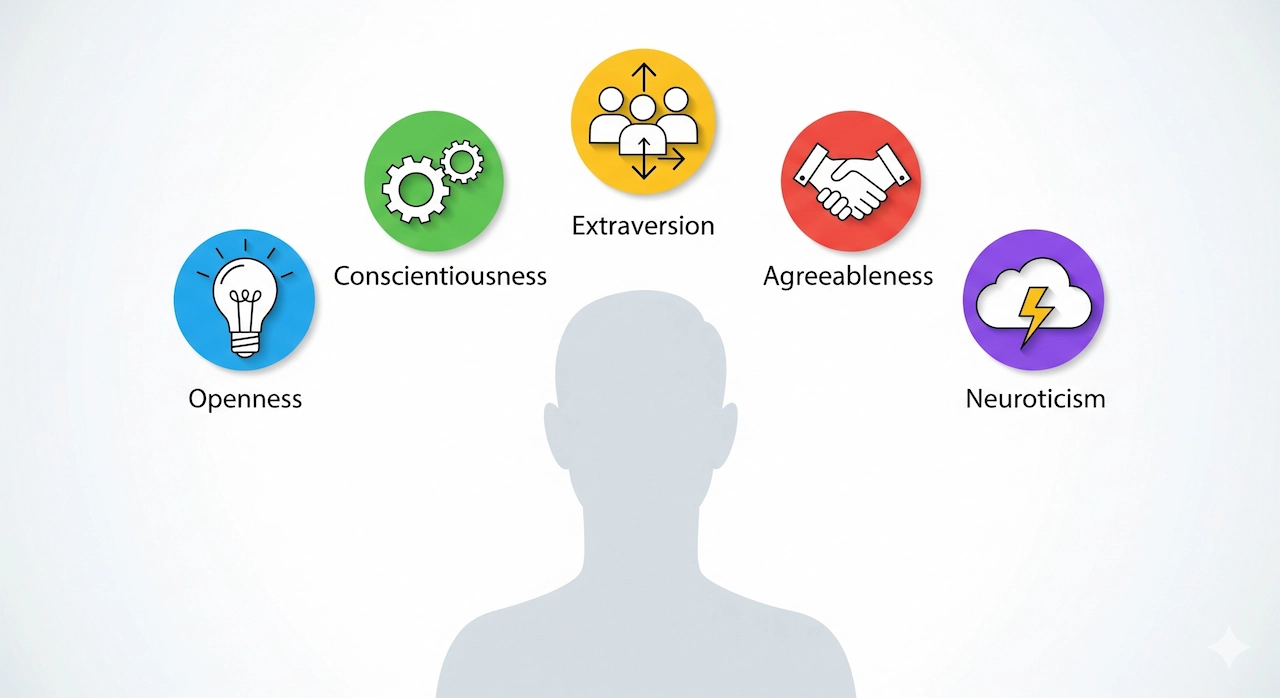In 2025, personality assessments are no longer limited to classrooms or psychological labs. The Big Five Personality Test, one of the most trusted and scientifically validated frameworks, has emerged as a powerful tool for self-discovery, education, and career planning. From recruitment drives to competitive exams and even wellness programs, personality tests are everywhere.
The Big Five model, also known as the Five-Factor Model, evaluates five core dimensions of human personality: Openness, Conscientiousness, Extraversion, Agreeableness, and Neuroticism. These traits provide a deeper understanding of behavior, decision-making, and long-term success.
As a trending exam and lifestyle topic, the Big Five Personality Test is reshaping how individuals look at themselves and their surroundings. But how exactly can it improve your life? Let’s explore the five most impactful ways.
1. Big Five Personality Test and Self-Awareness

The first and perhaps most significant benefit of the Big Five Personality Test is self-awareness. Knowing your personality traits helps you identify your natural strengths and weaknesses.
For instance, individuals who score high in Openness are more creative and curious, while those high in Conscientiousness are organized and reliable. Similarly, people with higher Extraversion thrive in social settings, while introverts find energy in solitude.
Educational experts argue that self-awareness is now as important as academic performance. Competitive exams such as MBA entrances and civil services have started incorporating personality-focused sections to assess emotional intelligence. By taking the Big Five Personality Test, students and professionals can align their goals with their natural inclinations, improving decision-making and long-term satisfaction.
👉 As psychology researchers highlight in the American Psychological Association Journal, greater self-awareness leads to stronger goal-setting and higher academic performance.
2. Stronger Relationships and Communication

Relationships—whether personal or professional—are influenced by personality. The Big Five Personality Test offers insights into how individuals interact with others.
For example, someone high in Agreeableness is empathetic and cooperative, making them excellent team players. Meanwhile, those who score higher in Extraversion are more likely to build networks and thrive in leadership roles.
Understanding these traits reduces conflicts in workplaces, schools, and even families. Couples counseling and corporate training programs increasingly rely on personality tests to improve communication.
Educational institutions are also including personality-based questions in exams to help students identify collaboration styles. Globally, businesses that adopt personality assessments during hiring have reported better retention and higher productivity.
👉 Harvard Business Review notes that companies using personality assessments witness improved collaboration and employee engagement. (Harvard Business Review)
3. Career Growth and Professional Success

In today’s competitive job market, academic knowledge alone is not enough. Employers are focusing on adaptability, leadership, and problem-solving abilities. The Big Five Personality Test plays a key role in recruitment and career development.
Human resource managers use it to determine whether a candidate fits the organizational culture. For example:
- A high Conscientiousness score suggests reliability and goal orientation—perfect for project managers.
- A strong Openness score indicates creativity, ideal for research and innovation roles.
- High Extraversion aligns with sales and leadership.
By knowing your personality traits, you can choose career paths that align with your strengths instead of forcing yourself into unsuitable roles. This not only enhances job satisfaction but also ensures long-term growth.
👉 According to a study by the Journal of Applied Psychology, personality traits predict job performance as strongly as cognitive ability tests.
4. Stress Management and Emotional Well-Being

Another crucial advantage of the Big Five Personality Test is its role in mental health. Traits like Neuroticism indicate how prone a person is to stress, anxiety, or emotional fluctuations. Recognizing this helps individuals create coping mechanisms.
For example, someone high in neuroticism can benefit from mindfulness practices, structured routines, and therapy. Meanwhile, those with high conscientiousness are naturally better at stress management through planning and organization.
This explains why personality tests are increasingly trending in education and public health discussions. Students preparing for competitive exams often face immense stress. Understanding personality helps them design personalized study schedules and relaxation techniques.
Global awareness campaigns on mental health, including World Mental Health Day, highlight the significance of such tools in promoting resilience.
👉 The National Institute of Mental Health emphasizes that self-knowledge through personality assessments reduces stress and improves overall well-being. (NIMH)
5. Lifelong Personal Growth and Development

The Big Five Personality Test is not just about academics or jobs—it’s about lifelong development. People evolve with time, and so do their personalities. Retaking the test periodically can provide insights into how experiences shape traits.
For instance, a shy student might gradually develop stronger extraversion after years of participating in group projects. Similarly, a professional may become more conscientious as career responsibilities grow.
Using the Big Five as a personal growth tool allows individuals to track progress, set realistic goals, and build resilience. It encourages adaptability, which is a key skill in a rapidly changing world.
In fact, many leadership development programs now integrate personality assessments as part of their curriculum. Students, professionals, and even retirees can benefit from ongoing self-reflection.
The Future of Personality Tests in Exams and Careers
Looking ahead, the role of personality tests in education and employment is expected to grow. Artificial intelligence and digital tools are already enhancing the accuracy of these assessments.
Competitive exams are likely to integrate personality-focused modules that evaluate emotional intelligence alongside academic skills. Organizations will continue to rely on personality tests to identify future leaders and innovators.
By embracing tools like the Big Five Personality Test, individuals can prepare themselves not just for exams, but also for lifelong success and well-being.
Conclusion
The Big Five Personality Test is more than just a questionnaire—it is a guide to unlocking human potential. From improving self-awareness and relationships to enhancing careers, managing stress, and promoting lifelong growth, the test offers practical and scientifically backed insights.
As exams, workplaces, and societies continue to evolve, personality tests will remain at the center of education and professional development. By understanding and applying the Big Five model, individuals can create a future that aligns with both their strengths and aspirations.
In the end, embracing the Big Five Personality Test is not just about knowing who you are—it’s about shaping who you can become.



